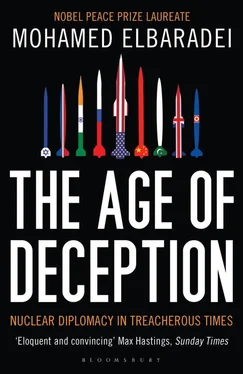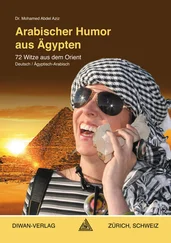John Bolton was openly supportive of Israel’s action. In an interview on CNN’s Late Edition , Wolf Blitzer asked Bolton what he thought of my public assertion that Israel should have brought its “evidence” to the IAEA. “If you believe that,” Bolton retorted, “I have a bridge to sell you. The notion that Israel or the United States would put their national security in the IAEA’s hands is just delusional.” [14] Interview on CNN’s Late Edition on November 11, 2007. Transcript retrieved from CNN archives at www.archives.cnn.com/TRANSCRIPTS/0711/11/le.01.html . A number of pundits commenting on this interview recalled a comment Bolton had made to Insight magazine in August 1999: “It is a big mistake for us to grant any validity to international law even when it may seem in our short-term interest to do so—because, over the long term, the goal of those who think that international law really means anything are those who want to constrict the United States.”
To hear these sentiments coming from the U.S. ambassador to the United Nations was dreadful.
Attacks notwithstanding, the Agency remained focused on its efforts to get to the bottom of the matter. I met with Ibrahim Othman, the head of the Syrian Atomic Energy Commission. If their denials were factual, I told him, the Syrians should make a categorical public statement to that effect and should invite an Agency team to the site, just to put an end to the nuclear speculation. Othman said he would convey my proposal to the Syrian authorities. I said I also found it strange that no Arab country had made a statement denouncing the Israeli attack on Syria.
Some six months after the bombing, during a visit to Sarajevo, I took a call from John Rood, the acting U.S. undersecretary of state for arms control and international security. A briefing to the U.S. Congress was scheduled for the next day, he told me. The target Israel had destroyed at Dair Alzour was, according to Rood, a nuclear reactor of North Korean vintage. Israel had alerted the United States to the presence of the reactor in 2006; the Americans had come to the same conclusion about the facility on their own in early 2007. Rood added that the United States planned to give IAEA safeguards officials an intelligence briefing, and he offered the same to me, either there in Sarajevo or on my return to Vienna.
Rood’s information was coming too late in the day. I told him, “The U.S. was obligated to share this information with the Agency, not to wait until Israel went and bombed the facility.” At a minimum, I said, the Americans could have let us know immediately after the bombing. By leaving us in the dark for a year before the bombing and six months after, they were undermining the nonproliferation regime. “You are making us look like fools,” I concluded. Rood had little to say in defense of withholding information. The United States would have preferred a diplomatic approach, he maintained, and they had not given Israel the green light to bomb the facility.
Back in Vienna, I issued a press statement deploring the fact that the information had not been shared with the IAEA in a timely manner and condemning Israel’s unilateral use of force. Neither Israel nor the United States responded to my statement. It seemed they had no wish to engage with me in a public debate; in any case, they would have lost. The Israeli action was a violation of every norm of international law regarding the use of force. It also showed total disregard for the nonproliferation regime. Yet very few countries—and not a single Western country—spoke up to denounce the action.
Israel undoubtedly did not want a reactor developed in any of the Arab countries they considered hostile. Assuming that the Dair Alzour site was a reactor, Israel may have concluded that Agency verification would have resulted in Syria putting the site under IAEA safeguards, making it harder for them to bomb it later on. The central issue, of course, was distrust on the part of Israel and the West of these countries’ future intentions.
As a next step, I asked Othman to come to Vienna to discuss modalities for verifying the American claims. At the beginning of the meeting, when we were alone, I emphasized the importance of Syria showing maximum transparency and allowing us to come to Dair Alzour and to other sites identified by satellites and thought to be related to the bombed site. He insisted they had no nuclear program at all—the facility, he said, had been a missile-related factory—but they were ready to agree to a visit by Agency inspectors.
We were then joined by Olli Heinonen and a foreign ministry colleague of Othman’s. The Syrians called for clarification about why we wanted to go to other sites in addition to the destroyed facility at Dair Alzour. We answered candidly: we had seen satellite photos that showed equipment being moved from the destroyed site to other locations, so it was important to verify the nature of these three other sites.
The next IAEA Board meeting took place in early June. In my opening statement, I said it was “deeply regrettable” that unilateral force had been resorted to before the Agency had been given an opportunity to establish the facts. I emphasized that Syria was obliged to report the planning and construction of any nuclear facility to the Agency. To my dismay, very few countries had anything to add regarding the Israeli attack on Syria. For the most part, Australia, Canada, the European Union, Japan, and of course the United States focused on the need for Syria to cooperate. The only European country to refer to the Israeli bombing was Switzerland. A few nonaligned countries also spoke out. But even some of the Arab countries sitting on the Board, such as Egypt, remained silent.
In a meeting with the twenty-seven European Union ambassadors, I told them they had undermined their credibility a great deal. “When you are not able to speak on a violation of one of the most basic tenets of the UN Charter,” I said, “your moral authority to speak up on democracy, human rights, and other issues is also greatly compromised.” Many of the ambassadors agreed, behind closed doors. But the European Union’s mode of operation on issues of nuclear proliferation was that the French and British monopolized the issuance of “joint opinions,” to the irritation of many.
Syria itself made a weak and defensive statement, which was also strange. Even stranger was that, according to the Iranian ambassador, Syria had asked him not to speak on the issue. I had suspected that something was brewing in a back room toward rapprochement between Syria and the United States. Syria’s behavior reinforced my view. They did not want to upset the cart.
An intelligence agency brought satellite images for the Agency to see, purportedly of Dair Alzour, which they said had been taken over a span of two years. The images helped clarify the design of the building that was alleged to have housed the reactor. Another intelligence agency provided additional photos, purportedly taken in the vicinity of the building, including inside. A certain individual who appeared in the photos was a North Korean we recognized from our dealings with Pyongyang. This gave the IAEA inspection team additional information on which to press their questioning of Syria. But Syria refused to cooperate in discussing any of the satellite images or other photos, simply maintaining that the building was a missile-related military installation and that the images were all fake.
In June 2008, Olli and his team of inspectors headed to Dair Alzour. The facility had been completely razed, and a new one built. The Syrians stuck to their story that there was nothing nuclear about the facility. The inspectors took environmental samples, and the Agency reached agreement with the Syrian authorities on a process for investigating the allegations about Dair Alzour.
Читать дальше












